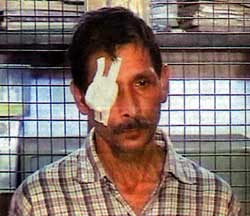 Because of his status in the Communist Party of Nepal (Maoist), Mohan Baidya alias Kiran, was also given the responsibility of political commissar of the Maoists' People's Liberation Army Eastern Division. Although he was already in charge of the party's eastern central command he was not among the rebels who attacked Bhojpur on 2 March because of his age. The attack was made under the leadership of Commander and politburo member Barshaman Pun, alias Ananta.
Because of his status in the Communist Party of Nepal (Maoist), Mohan Baidya alias Kiran, was also given the responsibility of political commissar of the Maoists' People's Liberation Army Eastern Division. Although he was already in charge of the party's eastern central command he was not among the rebels who attacked Bhojpur on 2 March because of his age. The attack was made under the leadership of Commander and politburo member Barshaman Pun, alias Ananta. Better known as the second senior most leader after Prachanda, Kiran is said to be the main ideologue and philosophical leader. He was the one to propose the concept of Prachandapath, the party's line, during the second national convention of the CPN (Maoist). He defined and explained Prachandapth, a concept that drew controversy in the communist movement of Nepal.
Before Prachanda had been chosen as the general secretary by the then Communist Party of Nepal (Masaal), Kiran held that post. The change of guard took place because of what was a 'sector scandal' dispute within the party 18 years ago. After the controversy, the party decided to demote all the leaders except Prachanda. That is how he got the promotion. Kiran was demoted to the position of politburo member. Prachanda was promoted.
Kiran was chosen as the party's general secretary after the party took disciplinary action against Mohan Bikram Singh who was ousted. It was then that the party split into two rival factions. Kiran was once a Nepali language teacher in a high school in Pyuthan district before his family later moved to Dang. He has three daughters and his wife is also said to have gone underground with him.
After the arrest of this senior Maoist leader, the rebels' morale has certainly dropped. The rebels were somewhat upbeat after their latest attacks in Beni and Bhojpur. In Maoist circles, there is talk that they may launch yet another fierce attack on a district headquarter. Chances are also equally high that they could take senior government officials hostage to pressurise the government to release their senior leaders.
Before Baidya, politburo member Matrika Prasad Yadab and central leader Suresh Ale Magar were arrested by Indian authorities and handed over to the government in western Nepal. Baidya, who had undergone a cataract operation just before his arrest in Siliguri, also suffers from asthma. He had been living in the same house in Siliguri for a while despite party workers suggesting he shift elsewhere.
The West Bengal state government was already apprehensive about the Maoist presence in the state because of the latter's increasing relations with the Kamatapuri Liberation Organisation, a banned political outfit in India.
What's more, the meeting between Maoist leaders and senior UML leaders some two years ago established Siliguri as a rebel shelter. It is believed that Indian security agencies were able to track Baidya down through his telephone. Similarly, Maoist leaders Yadab and Magar were also arrested last month after Indian security agencies tapped the phones.


